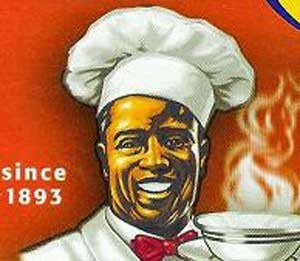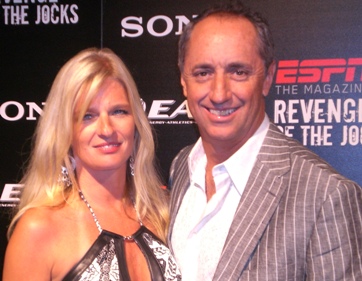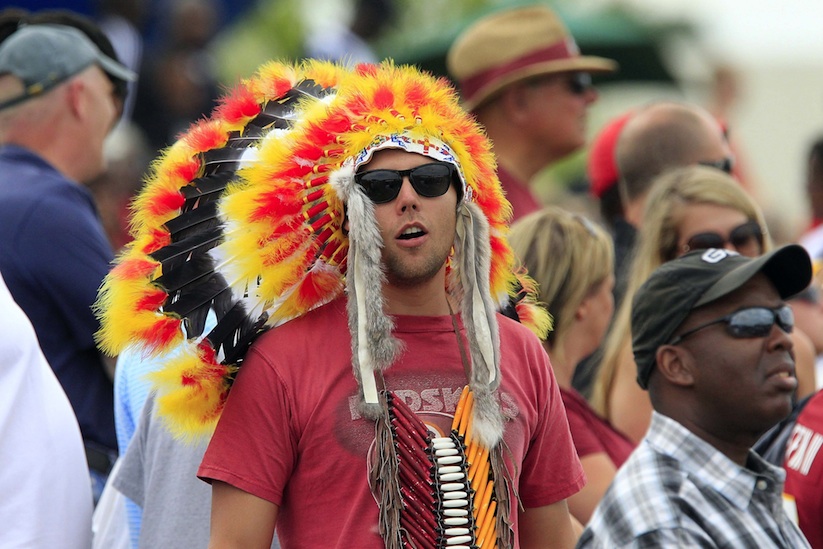Native American Group and Non-whites as Mascots: Fight Against ‘Redskins’ About More Than Just The Name
Divide & Conquer The media and the Redskins organization have attempted to make the Redskins logo issue simply a Native American issue - in essence, 'it is (probably) offensive only to (some of) them (non-whites we classified as "Native").' This is racist deception. In a white supremacy system all non-whites are niggers (in the absence of white supremacy niggers would not exist). [MORE] The only purpose of race is to practice racism. The Redskins logo along with other corporate brands that minstralize non-whites demean all persons of color. The effort to divide "minorities" into fractional (and frictional) groups is a response to white people's own numerical inadequacy or their for real, minority status. White people are vastly outnumbered throughout the world.
"The white "race" has structured and manipulated their own thought processes and conceptual patterns, as well as those of the entire non-white world majority, so that the real numerical minority (whites) illusionally feels and represents itself as the world's majority, while the true numerical majority (non-whites) illusionally feels and views itself as the minority."[MORE]
 From [HERE] One of the main criticisms of the opposition to the name of Washington’s professional football team, at least one propagated by name defenders like ESPN’s Rick Reilly (photo below), is that the efforts to change the name are driven largely by white apologists who aren’t in touch with the Native American community. That isn’t and hasn’t been true, but as controversy over the name has escalated to new heights this year and as the media has taken a new interest in amplifying complaints against the name, Native American groups are renewing their fight and shaping the argument in new ways.
From [HERE] One of the main criticisms of the opposition to the name of Washington’s professional football team, at least one propagated by name defenders like ESPN’s Rick Reilly (photo below), is that the efforts to change the name are driven largely by white apologists who aren’t in touch with the Native American community. That isn’t and hasn’t been true, but as controversy over the name has escalated to new heights this year and as the media has taken a new interest in amplifying complaints against the name, Native American groups are renewing their fight and shaping the argument in new ways.
The Oneida Nation is one of those groups. It has aired advertisements in New York targeting NFL commissioner Roger Goodell’s support for the name, protested outside a Green Bay Packers game against Washington, held a conference in D.C. opposite the NFL owners meeting, and will air radio ads in Dallas during Washington’s game there this weekend. The National Congress of American Indians, which has long opposed the name, is now joining the fight in a new way, releasing a white paper this week that details its long opposition to the use of Native American imagery in sports and the discriminatory history from which those names arose.
 The white paper also attempts to shatter another one of the central arguments in favor of names like “Redskins” and logos like the Cleveland Indians’ Cheif Wahoo: that changing them is nothing more than a political correctness issue and that Native Americans face far larger problems than a football team’s name or a baseball team’s logo. Citing research from sociologists and psychologists, NCAI’s white paper explains that these names and the stereotypes they perpetuate has harmful psychological and societal effects on Native Americans, a population that battles higher-than-average rates of suicide, alcoholism, depression, and addiction. From the paper:
The white paper also attempts to shatter another one of the central arguments in favor of names like “Redskins” and logos like the Cleveland Indians’ Cheif Wahoo: that changing them is nothing more than a political correctness issue and that Native Americans face far larger problems than a football team’s name or a baseball team’s logo. Citing research from sociologists and psychologists, NCAI’s white paper explains that these names and the stereotypes they perpetuate has harmful psychological and societal effects on Native Americans, a population that battles higher-than-average rates of suicide, alcoholism, depression, and addiction. From the paper:
Empirical evidence in a 2004 study by Dr. Stephanie Fryberg, a preeminent cultural and social psychology scholar and an enrolled member of the Tulalip Tribes in Washington state, showed that the use of American Indian-based names, mascots, and logos in sports have a negative psychological effect on Native peoples and positive psychological consequences for European Americans. Additionally, Fryberg has concluded that these mascots have negative effects on race relations in the United States.
When exposed to these images, the self-esteem of Native youth is harmfully impacted, their self-confidence erodes, and their sense of identity is severely damaged. Specifically, these stereotypes affect how Native youth view their world and their place in society, while also affecting how society views Native peoples. This creates an inaccurate portrayal of Native peoples and their contributions to society. Creating positive images and role models is essential in helping Native youth more fully and fairly establish themselves in today’s society.
Worse, those stereotypes don’t just have negative psychological effects for Natives. Fryberg’s research found that they also have positive effects on non-Natives that may contribute to violence against Native peoples, NCAI’s paper says:
The intolerance and harm promoted by “Indian” mascots have very real consequences. The alarmingly high rates of hate crimes against Native people indicates a need to take immediate action in a number of areas, including the removal of harmful images and education of the general public to diffuse additional hateful activity against Native peoples. According to a Department of Justice analysis, “American Indians are more likely than people of other races to experience violence at the hands of someone of a different race.” In Fryberg’s study, findings show that Native stereotypes lead to a boost in self-esteem for non-Natives, specifically European Americans: “American Indian social representations were associated with lower self-esteem for American Indians and higher self-esteem for European Americans.”
NCAI’s paper also notes that the American Psychological Association has “passed a resolution calling for the immediate retirement of American Indian mascots and imagery, citing potential negative effects it may have on the mental health and psychological behavior of American Indian people.” The American Sociological Association, meanwhile, has also called for an end to stereotypical Native American mascots, since “social science has demonstrated that the continued use of Native American nicknames, logos and mascots in sport harm Native American people in psychological, educational, and social ways.”
The fight to change the name of Washington’s football team and the logo of Cleveland’s baseball team isn’t simply about political correctness or imagery, but about what that imagery symbolizes and the effects it has on the people it depicts. Normalizing these stereotypes dehumanizes people, both to themselves and the rest of the surrounding society.
Native groups like NCAI have been fighting this battle for decades, but now that at least part of the American sporting media is listening, they are intensifying their efforts and amplifying their opposition to new ways. This isn’t just about a name, NCAI is saying. This isn’t just about how we’d prefer to identify people and what we should call them. And it isn’t happening in spite of other causes that could address the major problems facing the Native American community. Instead, this issue and these names, logos, and mascots are directly tied to those problems and directly tied not just to how our country views an entire group of people, but how that entire group of people views itself.
